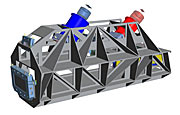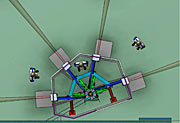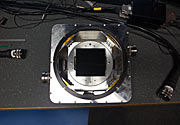Anuncio
ESO adjudica contratos para las cámaras del nuevo buscador de planetas
7 de Agosto de 2013
ESO ya ha firmado con la empresa francesa Winlight Systems los contratos correspondientes a la construcción de dos cámaras para el nuevo y potente buscador de exoplanetas, ESPRESSO.
El instrumento ESPRESSO (acrónimo de Echelle Spectrograph for Rocky Exoplanet and Stable Spectroscopic Observations) es un espectrógrafo de alta estabilidad que se instalará en el Observatorio Paranal de ESO en Chile en el año 2016. Será capaz de combinar la luz de las cuatro Unidades de Telescopios del Very Large Telescope (VLT) para crear un telescopio virtual con una apertura de 16 metros [1]. ESPRESSO está siendo desarrollado por un consorcio conformado por ESO y otros siete institutos científicos:
- Centro de Astrofísica de la Universidad de Oporto (Portugal)
- Facultad de Ciencias de la Universidad de Lisboa, el CAAUL (Centro de Astronomia e Astrofísica da Universidade de Lisboa) y el LOLS (Laboratory of Optics, Lasers and Systems) (Portugal)
- INAF - Observatorio Astronómico de Trieste (Italia)
- INAF - Observatorio Astronómico de Brera (Italia)
- Instituto de Astrofísica de Canarias (España)
- Instituto de Física de la Universidad de Berna (Suiza)
- Universidad de Ginebra (Suiza).
ESPRESSO continuará la labor del muy exitoso instrumento HARPS (High Accuracy Radial velocity Planet Searcher), instalado en el telescopio de 3,6 metros en el Observatorio La Silla de ESO. ESPRESSO no sólo se beneficiará de la enorme capacidad de recolección de luz que se obtiene al combinar las cuatro Unidades de Telescopios de 8,2 metros que forman parte del VLT, sino que además aprovechará las mejoras en la precisión de la estabilidad y la calibración, posibles en la actualidad (por ejemplo, la tecnología de peine de frecuencia láser).
Se espera que ESPRESSO permita a los astrónomos detectar planetas similares a la Tierra alrededor de estrellas cercanas, utilizando el método de la velocidad radial [2]. Además tendrá muchas otras aplicaciones científicas, incluyendo la búsqueda de posibles variaciones en las constantes de la naturaleza durante distintos momentos y en diversas direcciones, a través del estudio de la luz de cuásares muy lejanos.
El nuevo contrato comprende la provisión de las dos cámaras refractivas, una para la zona roja y otra para la región azul del espectro. Estos son componentes vitales del instrumento. Empleando superficies no esféricas (asféricas) y novedosos principios de diseño, logran una excelente calidad de imagen a través de un amplio campo con sólo tres elementos ópticos.
Enlaces
1] ESPRESSO será el primer instrumento en combinar la luz de las cuatro Unidades de Telescopios en un foco incoherente. El instrumento PIONIER ya ha logrado combinar estos cuatro rayos dentro del campo de la interferometría, donde los haces se combinan coherentemente (ann11021).
[2] Cuando un planeta orbita alrededor de una estrella produce una pequeña y continua variación en el componente de la velocidad medido a lo largo de la línea visual (conocido como velocidad radial) de un observador distante situado en la Tierra. Esta variación se puede apreciar como una "oscilación" en el espectro de la estrella, debido a que sus líneas se desplazan hacia delante y hacia atrás con respecto a su posición central, como resultado del efecto Doppler. A medida que el planeta se aleja del observador el cambio de la velocidad radial induce un desplazamiento del espectro de la estrella hacia longitudes de onda más largas (un corrimiento al rojo) y a longitudes de onda más cortas, cuando se acerca (un corrimiento al azul). Estas pequeñas alteraciones en el espectro de la estrella (que corresponden a velocidades extremadamente bajas que llegan a los 10 cm/s; aproximadamente la velocidad que alcanza una tortuga) pueden medirse con un espectrógrafo de alta precisión como el espectrógrafo ESPRESSO, y pueden utilizarse para inferir la presencia de planetas.
Contactos
Hans Dekker
ESPRESSO Instrumentation Engineer at ESO
Garching bei München, Germany
Tel: +49 89 3200 6268
Email: hdekker@eso.org
Francesco Pepe
ESPRESSO Prime Investigator
Observatoire Astronomique de l'Université de Genève
Tel +41 22 379 23 96
Email: Francesco.Pepe@unige.ch
Johannes Schimpelsberger
ESO, Contract Officer, Contracts and Procurement
Garching bei München, Germany
Tel: + 49 89 3200 6381
Email: jschimpe@eso.org
Richard Hook
ESO, Public Information Officer
Garching bei München, Germany
Tel: +49 89 3200 6655
Cell: +49 151 1537 3591
Email: rhook@eso.org
Sobre el anuncio
| Identificador: | ann13065 |
Our use of Cookies
We use cookies that are essential for accessing our websites and using our services. We also use cookies to analyse, measure and improve our websites’ performance, to enable content sharing via social media and to display media content hosted on third-party platforms.
ESO Cookies Policy
The European Organisation for Astronomical Research in the Southern Hemisphere (ESO) is the pre-eminent intergovernmental science and technology organisation in astronomy. It carries out an ambitious programme focused on the design, construction and operation of powerful ground-based observing facilities for astronomy.
This Cookies Policy is intended to provide clarity by outlining the cookies used on the ESO public websites, their functions, the options you have for controlling them, and the ways you can contact us for additional details.
What are cookies?
Cookies are small pieces of data stored on your device by websites you visit. They serve various purposes, such as remembering login credentials and preferences and enhance your browsing experience.
Categories of cookies we use
Essential cookies (always active): These cookies are strictly necessary for the proper functioning of our website. Without these cookies, the website cannot operate correctly, and certain services, such as logging in or accessing secure areas, may not be available; because they are essential for the website’s operation, they cannot be disabled.
Functional Cookies: These cookies enhance your browsing experience by enabling additional features and personalization, such as remembering your preferences and settings. While not strictly necessary for the website to function, they improve usability and convenience; these cookies are only placed if you provide your consent.
Analytics cookies: These cookies collect information about how visitors interact with our website, such as which pages are visited most often and how users navigate the site. This data helps us improve website performance, optimize content, and enhance the user experience; these cookies are only placed if you provide your consent. We use the following analytics cookies.
Matomo Cookies:
This website uses Matomo (formerly Piwik), an open source software which enables the statistical analysis of website visits. Matomo uses cookies (text files) which are saved on your computer and which allow us to analyze how you use our website. The website user information generated by the cookies will only be saved on the servers of our IT Department. We use this information to analyze www.eso.org visits and to prepare reports on website activities. These data will not be disclosed to third parties.
On behalf of ESO, Matomo will use this information for the purpose of evaluating your use of the website, compiling reports on website activity and providing other services relating to website activity and internet usage.
Matomo cookies settings:
Additional Third-party cookies on ESO websites: some of our pages display content from external providers, e.g. YouTube.
Such third-party services are outside of ESO control and may, at any time, change their terms of service, use of cookies, etc.
YouTube: Some videos on the ESO website are embedded from ESO’s official YouTube channel. We have enabled YouTube’s privacy-enhanced mode, meaning that no cookies are set unless the user actively clicks on the video to play it. Additionally, in this mode, YouTube does not store any personally identifiable cookie data for embedded video playbacks. For more details, please refer to YouTube’s embedding videos information page.
Cookies can also be classified based on the following elements.
Regarding the domain, there are:
- First-party cookies, set by the website you are currently visiting. They are stored by the same domain that you are browsing and are used to enhance your experience on that site;
- Third-party cookies, set by a domain other than the one you are currently visiting.
As for their duration, cookies can be:
- Browser-session cookies, which are deleted when the user closes the browser;
- Stored cookies, which stay on the user's device for a predetermined period of time.
How to manage cookies
Cookie settings: You can modify your cookie choices for the ESO webpages at any time by clicking on the link Cookie settings at the bottom of any page.
In your browser: If you wish to delete cookies or instruct your browser to delete or block cookies by default, please visit the help pages of your browser:
Please be aware that if you delete or decline cookies, certain functionalities of our website may be not be available and your browsing experience may be affected.
You can set most browsers to prevent any cookies being placed on your device, but you may then have to manually adjust some preferences every time you visit a site/page. And some services and functionalities may not work properly at all (e.g. profile logging-in, shop check out).
Updates to the ESO Cookies Policy
The ESO Cookies Policy may be subject to future updates, which will be made available on this page.
Additional information
For any queries related to cookies, please contact: pdprATesoDOTorg.
As ESO public webpages are managed by our Department of Communication, your questions will be dealt with the support of the said Department.



